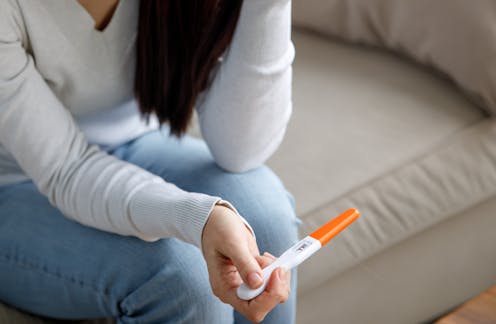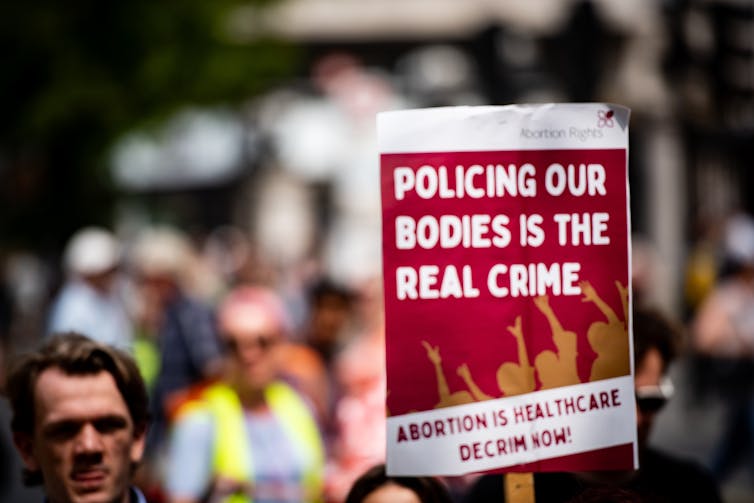
A vote on ending prosecutions for abortion appears to have been delayed again. MPs have been expecting to vote on this issue via an amendment to the criminal justice bill, which is currently making its way through Parliament.
The change – tabled by Labour MP Dame Diana Johnson and supported by a cross-party group – would remove the possibility of women being prosecuted for illegal abortion in England and Wales. The amendment is one of many attached to the criminal justice bill, but selection and debate of amendments has been repeatedly delayed.
It may come as a surprise that such a change is necessary in Britain, especially after abortion was decriminalised in Northern Ireland in 2019, and France has now made it a constitutional right.
The British laws that make abortion a crime are very old, and historically have been very rarely used to prosecute women. But now, apparently due to the increased awareness of the possibility of ending a pregnancy using pills, these laws are being more actively enforced.
Up to one in three British women access an abortion at some point in their lives. Many of them will use abortion pills, which are very safe, highly effective, and included on the World Health Organization’s list of essential medicines.
The archaic Victorian legal framework criminalising “unlawful procurement of miscarriage” (which applies in England and Wales) treats abortion pills as a “poison or other noxious thing” and is far removed from modern understandings of abortion as an essential health service. More than three-quarters of British adults believe that an abortion should be allowed where a woman decides on her own that she does not want to have a child.
The Abortion Act 1967 created an exemption, where no offence would be committed where a termination is authorised by two doctors and performed before 24 weeks (or beyond in exceptional cases). If these criteria are not met, abortion remains a criminal offence.
Several other amendments proposed to the criminal justice bill relate to abortion. One, tabled by Stella Creasy MP, proposes wider-ranging decriminalisation, while three others place further restrictions on access to abortion services.
Prosecutions of women ending their own pregnancies have, until recently, been rare. Only three cases were reported between 1861 and 2022, the most publicised being the 2013 case of a Yorkshire woman with an obstetric history of “disturbance, personal misery and entrenched problems”. She bought pills online and used them to terminate a pregnancy that had advanced far beyond the 24-week legal limit. She was initially sentenced to eight years in prison, reduced to three and a half on appeal.
There has recently been a dramatic rise in police investigations, fuelled by greater awareness of abortion pills following the introduction of telemedical abortion services during the pandemic. Women who might previously have sought pills outside the NHS could now access them legally within it. As an example, requests to Canadian non-profit organisation and online abortion service Women on Web, have dropped from hundreds per year to almost zero.
The trauma of abortion prosecution
British abortion providers have reported an increasingly suspicious and hostile environment around late pregnancy loss and a significant increase in police requests for access to patients’ medical records. In a small number of cases, women have faced prosecution after acting deliberately to end pregnancies after 24 weeks. In others, they have been investigated following spontaneous premature delivery or pregnancy loss.
One such example is Sammy (a pseudonym), who experienced a very premature delivery at home in 2023, with her baby born blue. She attempted CPR as her husband rang for an ambulance, but was shocked when police as well as paramedics responded. Her son survived. However, after being discharged from hospital, Sammy was taken in for questioning and her husband was arrested on suspicion of attempting to procure an illegal abortion.
Sammy’s case raised suspicions, as she had earlier struggled with whether to continue her pregnancy and had been seen at an abortion clinic. When told that she was too late for a lawful termination, she investigated buying abortion pills online, getting as far as putting them into her basket (though not checking out).

The police investigation has now been dropped, but it lasted for over a year and left Sammy traumatised. Her story was featured in a BBC File on 4 investigation, where she reported being unable to sleep properly due to ongoing fears that she’ll be “taken away”.
Women have had their computers and mobile phones seized as part of a “digital strip search”, making them even more isolated during a vulnerable time. One woman reported being required to express breast milk and leave it at the neonatal unit reception, as she was refused contact with her premature newborn.
No one wants women to end late pregnancies on their own at home. However, the reported facts in those rare and disturbing cases where they have done so suggests ordinary women acting in desperation at a moment of personal crisis. The question is whether we should respond with medical care, support and appropriate safeguarding, or with the full force of the criminal law.
And anyone who wishes to defend the need for such prosecutions must also defend the uncomfortable truth that some women – like Sammy – will be inevitable collateral damage.
This piece has been updated to clarify that the proposed reforms would apply in England and Wales only.
Sally Sheldon had received funding from the Arts and Humanities Research Council.
This article was originally published on The Conversation. Read the original article.







